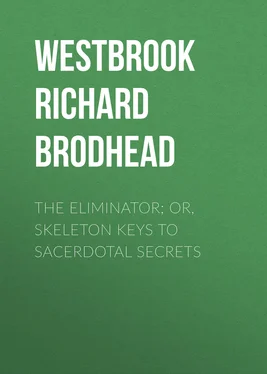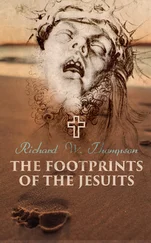Richard Westbrook - The Eliminator; or, Skeleton Keys to Sacerdotal Secrets
Здесь есть возможность читать онлайн «Richard Westbrook - The Eliminator; or, Skeleton Keys to Sacerdotal Secrets» — ознакомительный отрывок электронной книги совершенно бесплатно, а после прочтения отрывка купить полную версию. В некоторых случаях можно слушать аудио, скачать через торрент в формате fb2 и присутствует краткое содержание. Жанр: foreign_prose, foreign_religion, Философия, foreign_psychology, foreign_antique, на английском языке. Описание произведения, (предисловие) а так же отзывы посетителей доступны на портале библиотеки ЛибКат.
- Название:The Eliminator; or, Skeleton Keys to Sacerdotal Secrets
- Автор:
- Жанр:
- Год:неизвестен
- ISBN:нет данных
- Рейтинг книги:3 / 5. Голосов: 1
-
Избранное:Добавить в избранное
- Отзывы:
-
Ваша оценка:
- 60
- 1
- 2
- 3
- 4
- 5
The Eliminator; or, Skeleton Keys to Sacerdotal Secrets: краткое содержание, описание и аннотация
Предлагаем к чтению аннотацию, описание, краткое содержание или предисловие (зависит от того, что написал сам автор книги «The Eliminator; or, Skeleton Keys to Sacerdotal Secrets»). Если вы не нашли необходимую информацию о книге — напишите в комментариях, мы постараемся отыскать её.
The Eliminator; or, Skeleton Keys to Sacerdotal Secrets — читать онлайн ознакомительный отрывок
Ниже представлен текст книги, разбитый по страницам. Система сохранения места последней прочитанной страницы, позволяет с удобством читать онлайн бесплатно книгу «The Eliminator; or, Skeleton Keys to Sacerdotal Secrets», без необходимости каждый раз заново искать на чём Вы остановились. Поставьте закладку, и сможете в любой момент перейти на страницу, на которой закончили чтение.
Интервал:
Закладка:
I do not expect caste clergymen to read this book any farther than is necessary to denounce it. It is their way of meeting questions like those herein discussed. I am prepared to have certain dilettanti sneer-ingly say, “This book is of no critical value.” They are so accustomed to “scholarly essays” which “are poetically sentimental and floridly vague” that they have little respect for anything else. The book is intended for the common people, and not for the professional critics.
I do not expect everybody to agree with me, especially at first. Truth can afford to wait, and in years to come many points that I have made, which are now so startling, will be calmly and intelligently accepted.
There are probably mistakes in the book—mistakes in names, in dates, and perhaps in facts; but these will not affect the main argument. No man knows everything. Until recently it was never suspected by the learned world that The Contemplative Life was not written by Philo nearly nineteen centuries ago, instead of being written by a monk in the third century of the Christian era. Even Macaulay and Bancroft have made mistakes, and so have many other authors of good repute.
I have always tried to preserve a reverent spirit —a genuine respect for true religion and morality. I have always been profoundly religious, and cannot remember the time when I was not devout. But I do not believe that it is ever proper “to do evil that good may come.” In this work I have sought only the truth , in the firm conviction that superstition and falsehood cannot promote a course of right living , which is the object and aim of all true religion.
I have a supreme disregard for literary fame. I do not shrink from being called a compiler or even a plagiarist . There is absolutely very little of real originality in the world. I could have followed the course of many writers and absorbed or assimilated , and thus seemingly made my own what they had written; but I have chosen to quote freely, and so have substantially given the words of many authors of repute, and at the same time saved myself the labor of a re-coining, which does not, after all, deceive the intelligent reader. The books from which I largely quote are mainly voluminous and very expensive, and some of them are out of print. I am indebted to the learned foot-notes of Evan Powell Meredith in his prize essay on The Prophet of Nazareth for several things, and must not fail to acknowledge my obligations to certain living authors for valuable assistance, and especially to my friend Dr. Alexander Wilder, who prepared at my request the substance of Chapter X., The Drama of the Gospels , and who, in my judgment, has few superiors in classical and Oriental literature.
I sympathize with those persons who will complain-ingly exclaim, “You have taken away my Saviour, and I know not where you have laid him.” But suppose that we do not need a Saviour in the evangelical sense? Suppose that man has not fallen , but that the race has been rising these many centuries; and that while we have mainly to save ourselves, all the good and great men of all ages have aided us in the work of salvation by what they have said and done and suffered, so that instead of one savior we really have had many saviors. I think that this view is more reasonable and consoling than the commercial device of what is called the “scheme of redemption,” besides having scientific facts to sustain it.
I have preserved on the title-page some of my college degrees, to indicate my professional studies of theology and law, and not from motives of pedantry.
B. WESTBROOK.
1707 Oxford Street,
Philadelphia.
CHAPTER I. THE WHOLE TRUTH
“For there is nothing covered that shall not be revealed, neither hid that shall not be known. Therefore, whatsoever ye have spoken in darkness, shall be heard in the light, and that which ye have spoken in the ear, in closets, shall be proclaimed upon the housetops.”—Luke 12: 2, 3.
THE assumption is general that if the faith of the common people should be unsettled as to some things which they have heretofore been taught regarding religion, they would immediately reject all truth, and fall into a most deplorable state of skepticism and infidelity, and that the existing institutions of religion would be destroyed, and public virtue so undermined as to endanger the very foundations of morality and civil government. This is not only the fear of conservative and timid clergymen, but many of our prominent statesmen seem anxious lest the enlightenment of the people in matters in which they have been cruelly deceived should so weaken the restraints of police and governmental authority as to result in universal anarchy and a general disregard of the rights of property, and even of the sacredness of human life.
These foolish fears show a great want of confidence in human nature, and falsely assume that moral character depends mainly upon an unquestioning faith in certain dogmas which, in point of fact, have no necessary connection with it.
The statistics of crime show that a very large majority of those who have been seized by the strong arm of the law as dangerous members of society are those who most heartily believe in those very dogmas of theology which we are warned not to criticise, though we may know them to be accretions of ignorance and superstition, and that some of them have a natural tendency to fetter the essential principles of true religion and that higher code of morality which alone can stand strong under all circumstances. It is safe to affirm that ninety-nine hundredths of the criminal class believe, or profess to believe, in the dogmas of the dominant theology, Romish and Protestant; which are essentially the same.
It is too often forgotten that the very first condition of good government is faith in human nature, confidence in the people. You always excite dishonor and dishonesty by treating men as if you think them all rogues, and as if you expect nothing good from them, but every conceivable evil, only as they may be restrained by the fear of pains and penalties in this life and after death.
One great fundamental mistake of theologians and dogmatic pietists is the baseless assumption that religion is something supernatural, not to say anti-natural; something external to human nature and of foreign origin; something to be received by transfusion as the result or consequence of faith in certain dogmas or the observance of external rites; something bottled up by the Church, like rare and precious medicines in an apothecary-shop, to be dealt out to those who are willing to follow priestly prescriptions and pay the required price.
The fact is, churches and scriptures and dogmas are the outcome of that religious element which is inherent in human nature. It cannot be too often or too strongly urged that the religious principle is innate and ineradicable in mankind, and that you might as well try to destroy man’s love of the beautiful, his desire for knowledge, his love of home and kindred, or even his appetite for food, as to try to destroy it. It is as natural to feel the want of religion as it is to be hungry. You cannot^ destroy the foundations of religion. They rest in *nature and antedate all creeds and churches, and will survive them.
Even Professor Tyndall says: “The facts of religious feeling are to me as certain as the facts of physics.”
… “The world will have religion of some kind.”… “You who have escaped from these religions into the high and dry light of intellect may deride them, but in doing so you deride accidents of form merely, and fail to touch the immovable basis of the religious sentiment in the nature of man. To yield this sentiment reasonable satisfaction is the problem of problems at this hour.”
Читать дальшеИнтервал:
Закладка:
Похожие книги на «The Eliminator; or, Skeleton Keys to Sacerdotal Secrets»
Представляем Вашему вниманию похожие книги на «The Eliminator; or, Skeleton Keys to Sacerdotal Secrets» списком для выбора. Мы отобрали схожую по названию и смыслу литературу в надежде предоставить читателям больше вариантов отыскать новые, интересные, ещё непрочитанные произведения.
Обсуждение, отзывы о книге «The Eliminator; or, Skeleton Keys to Sacerdotal Secrets» и просто собственные мнения читателей. Оставьте ваши комментарии, напишите, что Вы думаете о произведении, его смысле или главных героях. Укажите что конкретно понравилось, а что нет, и почему Вы так считаете.












